1217 Interview with Lesley Krueger
INTERVIEW: Lesley Krueger with The British Columbia Review
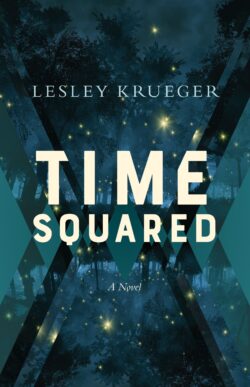 Born and brought up in Vancouver, Lesley Krueger is a novelist and screenwriter. She is the author of seven books, including the critically acclaimed novels, The Corner Garden (2003) and Mad Richard (2017). As a filmmaker, she has worked as a screenwriter, script doctor, story editor, and co-producer on 16 produced films over the past 17 years, ranging from micro-budget shorts to studio features. She lives with her husband in Toronto, where she’s an avid member of a women’s hockey league.
Born and brought up in Vancouver, Lesley Krueger is a novelist and screenwriter. She is the author of seven books, including the critically acclaimed novels, The Corner Garden (2003) and Mad Richard (2017). As a filmmaker, she has worked as a screenwriter, script doctor, story editor, and co-producer on 16 produced films over the past 17 years, ranging from micro-budget shorts to studio features. She lives with her husband in Toronto, where she’s an avid member of a women’s hockey league.
A richly atmospheric portrait of women’s agency and the timelessness of love, Time Squared (Toronto: ECW Press, September 2021) explores the enduring roles of rights, responsibility, and devotion throughout history. Robin and Eleanor meet in 1811 at the British estate of Eleanor’s rich aunt Clara. Robin is about to leave to fight in the Napoleonic Wars, and her aunt rules out a marriage between them. Everyone Eleanor knows, including Robin, believe they’ve always lived in these times.
But Eleanor has strange glimpses of other eras, dreams that aren’t dreams but memories of other lives. And their time jumps start as their romance deepens. Robin fights in the Boer War, the First and Second World Wars, in Vietnam and Iraq. Meanwhile, Eleanor struggles to figure out what’s going on, finally understanding that she and Robin are being manipulated through time.
Who is doing this, and why? Arriving in modern times, Eleanor sets off to confront the ones she discovers are behind this — chess masters playing her like a pawn. Eleanor’s goal? To free herself to live out her life on her own terms. Time Squared examines the roles women are forced to play in different centuries, the power they’re allowed, the stresses they face — and what this does to their relationships. — Ed.
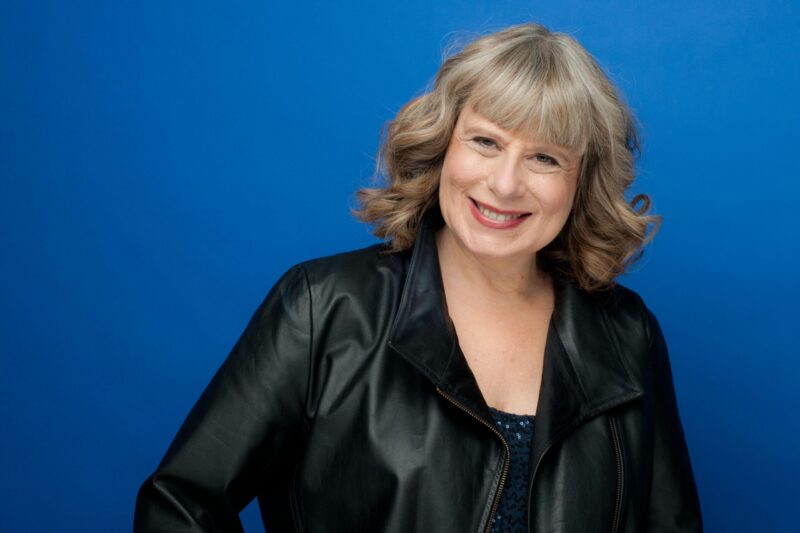
The Ormsby Review: With time travel being what it is today, what types of past literature, film, art or non-fiction did you consult while writing Time Squared?
Lesley Krueger: When I’m writing a book, I avoid reading fiction or watching films that play with the same overarching idea. In this case, time travel. I’m afraid of unconsciously stealing material — or going down the rabbit holes of other creators’ imaginations. So I research my work using non-fiction sources, and in this case I read many a great many widely-unread bestsellers like A Brief History of Time by Stephen Hawking. However, the thoughts on time travel most central to this work are the bastard grandchildren of theories developed by Oxford professor Nick Bostrum, although I’ll avoid spoilers by saying how.
The Ormsby Review: If you could travel anywhere in time with anyone, where and who would you choose?
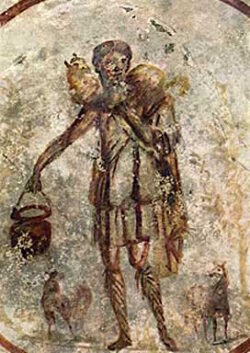
Lesley Krueger: Let’s make this specific: I would like to travel in time but not be stuck in an era without modern medicine. With my husband, who is good on logistics, I’d like to drop in on Palestine two thousand years ago to see what Jesus of Nazareth was really like. I was brought up in the Christian tradition; other writers might choose to visit holy men of their religions. Not that I’m a churchgoer, nor do I have any intention of writing about the historical Jesus. Not in the idea book. But maybe Jesus would have some thoughts about 2,800 dead Indigenous children he could pass on to the Pope. You know, during prayer. If he wasn’t able to, maybe my husband and I just would just sit under a palm tree eating loaves and fishes. I like fish. Also hummus, if people made it back then. Take a float in the Dead Sea. After which I’d come home.
The Ormsby Review: Robin continues to fight in different wars throughout time in a sort of permanent hell. Can you talk about his character a wee bit, without giving away too much? How did you write the voice/ actions of a man who stays the same physically, but who mentally must behave of his time in a given era?
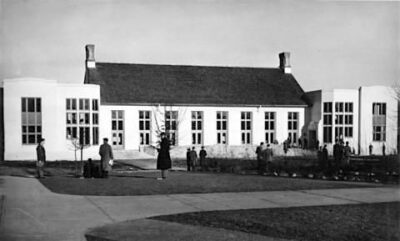
Lesley Krueger: The technology of war has changed radically over the centuries, but I don’t think the horror has. Robin is an individual with quirks and insights apart from his profession, and I worked on building his character the way I do with all my characters. I create incidents and watch the way my characters react. What does this one or that one want to say and do? For any writer, there can be wonderful moments when a character says something you had no idea he or she was going to say. I was fortunate to have a few of those with Robin, so he developed a quiet but casual and observant personality, dutiful and humorous, although he’s also increasingly damaged by war.
My father fought in the Canadian Army throughout the Second World War. I know a bit too much about that sort of trauma, and seem to write about damaged soldiers obsessively often. Robin isn’t like my father. But professionally speaking, both of them are (or in my father’s case, were) Everyman, the Universal Soldier, Ulysses trying to find his way home.
The Ormsby Review: You went to UBC, a great university that continues to foster and support a lot of excellent literary talent in Canada. Can you talk about your fondest or most memorable times in BC?
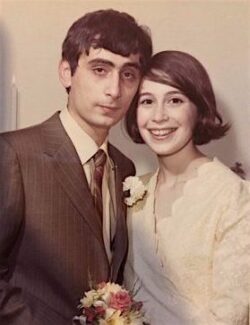
Lesley Krueger: I grew up in North Vancouver, across the Lion’s Gate Bridge from UBC. The first time I visited the campus was on a field trip with my high school English teacher, Gabor Maté. Yes, Dr. Gabor Maté, just out of UBC himself and not yet enrolled in medical school. Gabor took us into the offices of The Ubyssey student newspaper, where he had worked throughout his undergraduate career. I can still see the scruffy office as I saw it on that field trip, upstairs in the Student Union Building, with a pair of U-shaped copy desks and cool-looking people around it. This trip gave me the nerve to go back and sign up for the paper when I started UBC that fall.
I had also been admitted to the creative writing program, but that didn’t stick and The Ubyssey did. I worked on the paper for four years with people who are still my great friends. Not to mention my future husband, Paul Knox. I became the editor in my fourth year, controlling a pretty impressive six-figure budget when I was twenty years old, and meanwhile interviewing people like Joan Baez when they appeared on campus. I could go on about the paper forever. I loved it there. And although I dropped out of creative writing — I hated the condescending male profs — I wrote my first novel in my scant off hours between the ages of seventeen and twenty-one. It was awful.
The Ormsby Review: People still smoke cigarettes. This is sort of like time travel. I mean, if you’ve smoked every day since you were sixteen and are still alive, you can sort of predict what might happen to you. Can you think of other examples?
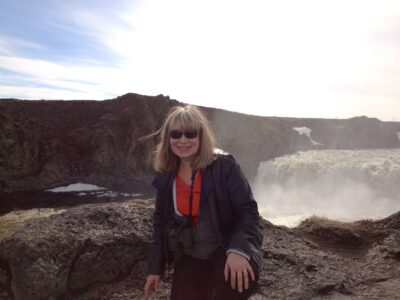
Lesley Krueger: We all know enough to predict many possible futures. I look at my knuckles and think, Yeah, one day I’m going to have arthritis like my mother. I’d better look into voice-recognition programs one day. Of course, I also hope researchers will find an effective treatment. People who smoke might think that way, too. In other words, we all constantly travel in time—not only forward to possible outcomes, but backwards to possible causes. Damn, I wish I hadn’t started smoking at sixteen, but there was this awful…
What primarily interests me as a writer is this web of causation and outcomes. How did I get where I am now? Did V lead to W, which led to me getting an X-ray? So time travel was an obvious subject for me to tackle someday.
The Ormsby Review: What is your favourite genre to read, and why?
Lesley Krueger: I like good books in all genres. Would you say Colson Whitehead writes historical fiction or does he just write literature? Does Helen Oyeyemi write speculative fiction, folk tales, fairy tales, or does she just write literature, too? I admit to a weakness for nineteenth century novels, and I love reading social histories about all places and eras. A recent awful factoid I read about Vikings: They were rabid slavers who kidnapped and sold other Europeans, including other Scandinavians, to anyone buying.
*
The Ormsby Review. More Books. More Reviews. More Often.
Publisher and Editor: Richard Mackie
The Ormsby Review is a journal service for in-depth coverage of B.C. books and authors. The Advisory Board consists of Jean Barman, Wade Davis, Robin Fisher, Cole Harris, Hugh Johnston, Kathy Mezei, Patricia Roy, Maria Tippett, and Graeme Wynn. Scholarly Patron: SFU Graduate Liberal Studies. Honorary Patron: Yosef Wosk. Provincial Government Patron since September 2018: Creative BC
“Only connect.” – E.M. Forster
2 comments on “1217 Interview with Lesley Krueger”
Dear Leslie,
Thanks for this wonderful interview that gives glimpses into your life this past 45 or more years. Michael Hayward forwarded this interview to me and I read it with great interest. With my interest in time travel, I am looking forward to reading Time Squared. Now that you have finished the book I hope you will watch the Ministry of Time Spanish tv series and the movie The Time Traveller’s Wife (much better than the book). Both Michael and I find it wonderful that our classmate from Grade 4 to 10 or 11 is a published author. Best wishes for future books and adventures. I have always wanted to go to Iceland.
Thanks, Linda. Amazing to hear from you after all these years. I hope you’re well. Still in North Van? I’ve lived in Toronto for a long time, and this is my fifth novel and seventh or eighth book, depending on how you count. I hope you enjoy it, and wish times permitted a trip to Vancouver to say hello. Cheers, Lesley